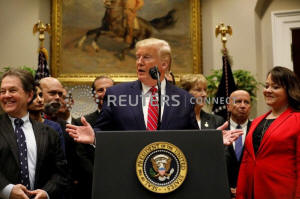Trump asks Supreme Court to stop Congress from getting his financial
records
 Send a link to a friend
Send a link to a friend
 [November 16, 2019]
By Lawrence Hurley and Karen Freifeld [November 16, 2019]
By Lawrence Hurley and Karen Freifeld
WASHINGTON (Reuters) - President Donald
Trump on Friday asked the U.S. Supreme Court to block a lower court
ruling directing an accounting firm to hand over his financial records
to a Democratic-led congressional panel, setting up a major clash
between branches of government.
Trump turned to the justices after the U.S. Court of Appeals for the
District of Columbia Circuit decided on Wednesday that it would not
revisit its October decision backing the House of Representatives
Oversight Committee's authority to subpoena the records from Mazars LLP,
Trump's longtime accounting firm.
In a separate case, Trump on Thursday asked the Supreme Court to review
a New York-based federal appeals court's ruling that local prosecutors
can enforce a subpoena also issued to Mazars demanding Trump's personal
and corporate tax returns from 2011 to 2018.

The Republican president's lawyers have called the Oversight Committee's
subpoena to Mazars illegitimate.
The lower court ruling, if left intact, would bring House Democrats
closer to shedding light on the inner workings of Trump's business
interests even as they pursue an impeachment inquiry against him
focusing on his dealings with Ukraine.
The case represents an important showdown at the top U.S. court over the
powers of the presidency versus those of Congress.
"For the first time in our nation's history, Congress has subpoenaed the
personal records of a sitting president from before he was in office,"
said Jay Sekulow, one of Trump's lawyers.
"And, for the first time in our nation's history, a court upheld a
congressional subpoena to the president for his personal papers. Those
decisions are wrong and should be reversed," Sekulow added.
Trump's lawyers said in court papers that if the court ruling is allowed
to remain intact, it would give Congress broad authority to "dig up dirt
on political rivals."
"It has now been seven months since the Oversight Committee asked for
these records. It is time for the president to let us do our job and
stop blocking Mazars from complying with the committee's lawful
subpoena," said Democratic Representative Carolyn Maloney, the acting
chairwoman of the committee.
The committee said it needs to records from Mazars to determine if Trump
complied with laws requiring disclosure of his assets, and to assess
whether those laws needed to be changed.
[to top of second column]
|

President Donald Trump delivers remarks on honesty and transparency
in healthcare prices inside the Roosevelt Room at the White House in
Washington, U.S., November 15, 2019. REUTERS/Tom Brenner

It is not clear exactly what records were subpoenaed but, according
to Trump's lawyers, the panel did not specifically ask for Trump's
tax returns.
The court has a 5-4 conservative majority that includes two Trump
appointees: Neil Gorsuch and Brett Kavanaugh.
FAST TRACK
Both Trump cases are likely to be on a fast track, meaning that if
the court decides to hear them, a ruling would be possible before
the end of June, when its current term ends.
The court must decide whether to grant Trump's emergency application
in the congressional subpoena case. If it refuses, the documents
would have to be handed over to lawmakers. Five votes among the
justices are needed to grant a stay request.
The House subpoena case is a test of how far Congress can go in
investigating Trump and his business affairs.
If the Supreme Court ultimately rules in the case, it could set a
major new precedent on the ability of Congress to investigate a
sitting president. Similarly, in the New York case, Trump's lawyers
have made a broad argument in favor of complete presidential
immunity from criminal investigations - even if the president shoots
another person - while in office.
In 2016, Trump broke with a decades-old convention of presidential
candidates releasing their tax returns. He has kept them secret
since taking office.

Trump sued the House committee in April, arguing that its subpoena
exceeded congressional investigative powers. A judge ruled against
Trump in May, saying the documents might assist Congress in passing
laws and performing other core functions.
(Reporting by Lawrence Hurley and Karen Freifeld. Additional
reporting by Jan Wolfe.; Editing by Chris Reese and Rosalba O'Brien)
[© 2019 Thomson Reuters. All rights
reserved.]
Copyright 2019 Reuters. All rights reserved. This material may not be published,
broadcast, rewritten or redistributed.
Thompson Reuters is solely responsible for this content. |